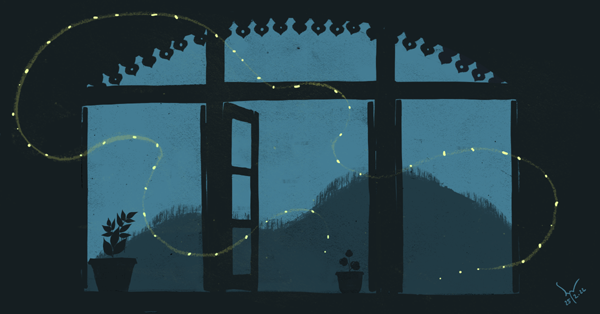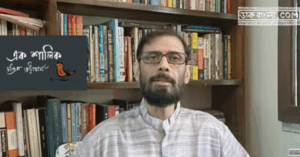We think of forests as places of solitude and silence, except when tigers roar and elephants trumpet; but there are always sounds, more subtle than these, that come to the notice of the sensitive wanderer.
Many years ago I lived in a small cottage on the edge of the forest, on the outskirts of the hill station of Mussoorie. A steep and narrow footpath led down through oaks and maples to the red-roofed house that was to be my home for several years.
It was early summer, and when I opened the windows I was assailed by the strident chorus of hundreds of cicadas informing me, and anyone who cared to listen, that it would be raining before long. The cicadas make their shrill music by scraping their legs against their quivering bodies. It’s hard to find them, they merge with the trunks of the trees they inhabit, but they are there all summer, constantly reminding you of their presence.
I was a great walker in those days, and my walks took me down to the stream at the bottom of the hill. It made its own sounds, as it tumbled over the rocks and pebbles rendered smooth by hundreds of years of the passage of running water. Often, a forktail could be seen hopping from one rock to another. It was a silent bird, pursuing dragonflies that hovered over the sunlit stream. Not so silent were the magpies, who gossiped in the overhanging branches of willows, water-wood, and walnut. And in the brambles, the wild raspberry and blackberry bushes, small birds – wagtails and finches – made merry.
On a knoll above the stream was a lone pine tree, and sometimes I would recline beneath it, notebook and ball-point pen at hand, and write a poem or part of a story or a ‘remembrance of things past’. But I was no Proust. My mentors were Thoreau and Richard Jefferies. Walden and The Story of My Heart were often my companions.
To write a poem upon a grassy knoll, with a zephyr, a gentle breeze, playing in the branches of pine, is to live the poem even as you write it. And today, looking back over the years, I can hear the breeze and feel it, and listen to the sound of the system, and the song of the forest, and it is the poem of all my days.
And sometimes, late in the evening, as the full moon rose over the summit of Landour, silhouetting the deodars, I would go out for one of my nocturnal walks, and then the sounds would be more muted, more secretive. An owl talking to himself in the depths of an old oak tree. A nightjar making an occasional comment, like a tap on a table…. A barking deer. Something urgent, frantic about its call tonight. It is on the run from a predator.
I have been in the cottage for three or four years when one day a predator far more dangerous than the leopard arrives on the scene. It is the P.W.D.’s road-building crew, and they have the authority to build a road right through the front garden, in order to link up with another more important road further along the mountains. They have come equipped with explosives, bulldozers, and an army of road workers. I have to move. And so must some of the forest.
Presently I hear the sawing cough of a leopard. It is not an animal that roars in order to intimidate. Like most cats, big or small, it is a silent pursuer. Even so, that cough is a distinctive one.
My balcony light is on. From my window I can see the garden at the rear of the cottage. No porcupines about; my dahlia bulbs are safe. But darting into the garden is the terrified barking deer. It runs here and there, looking for a hiding place, then dashes into my woodshed and stands trembling behind a stack of firewood. Will it be safe there?
Leopards were made to hunt and devour their prey; but tonight I am on the side of the helpless deer. I have no gun, being averse to such abominations. But I can make enough noise to scare the leopard away. There are some firecrackers in a cupboard. I light a string of crackers and toss them into the garden. They rattle away like a machine-gun, shattering the silence of the forest.
Has the leopard gone away? I have no idea. But presently that barking deer slips out of its place of refuge and darts into a thicket of dog-roses. There are no sounds of a struggle. Perhaps it is safe for the night; for this one night, anyway.
I have been in the cottage for three or four years when one day a predator far more dangerous than the leopard arrives on the scene. It is the P.W.D.’s road-building crew, and they have the authority to build a road right through the front garden, in order to link up with another more important road further along the mountains. They have come equipped with explosives, bulldozers, and an army of road workers. I have to move. And so must some of the forest. Oaks, walnuts, pines, maples, all fall to the axe and the electric saw. The birds go elsewhere. Small animals migrate. Even the porcupines abandon the garden, for the dahlias and gladioli have vanished.
I move higher up the mountain. More roads. You can’t escape them. I find a small apartment, part of a larger building overlooking the main road, the road to the summit, Lal Tibba. There’s plenty of forest up there, but here it’s all road, with scores, nay, hundreds of cars from Delhi, Haryana, and Punjab laboring up the hill, honking and tooting, all in a hurry to get a view of the eternal snows. They won’t see much unless they get up very early. By noon, cloud and mist have obscured the higher ranges. I hear a tourist from Punjab complaining to his guide: ‘You brought us all the way up here, and what did we see? A kabristan, a cemetery!’ He was referring to the old Landour cemetery on the north face of the mountain. It has the best view of the snows. But only the old caretaker enjoys the view. The occupants of the graves are still sleeping.
At night the visitors and the cars have gone, the road below is silent except for a dog howling at the moon. It’s a warm night and my window is open. The lights are out. Presently a firefly, a jugnu, floats into my bedroom on the night breeze. It moves around, lighting up little spaces. I haven’t seen a firefly since I left the old cottage. It’s like a visit from an old friend; a tiny star come down to see me in the still of the night.
I feel as though it’s summoning me back to my old haunts.
I am too old now to walk to the singing forest, but I will pay homage to it in my own way, with these my written words. And, in the meantime, keep coming little firefly!
Illustration by Sayan Chakraborty



